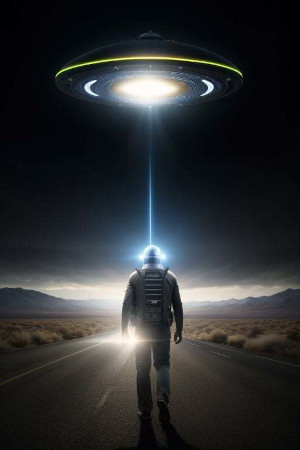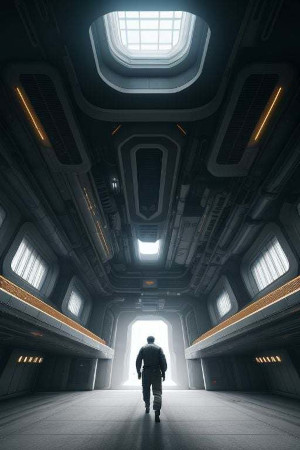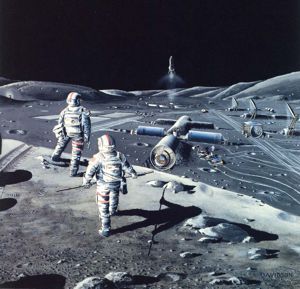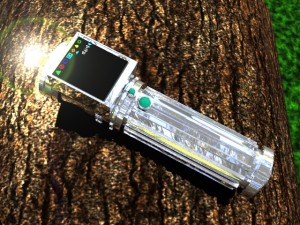2014
Dec
20
What is Hard Sci-Fi?
We all know what hard sci-fi is, don't we? It's that ... well.... I thought I knew what it was until I visited KindleBoards, which I don't do nearly as often as I should, and checked in on a thread I'd commented on. Another member had said that he read mostly hard science fiction, biographies, and science, and that writers of those were quite rare. I was immediately delighted because I write hard sci-fi — don't I? — and that makes me a rare commodity. But after a moment's thought, I asked myself, "Do I?" After all, who's to say that his definition matches mine, or that either matches the science fiction community at large?
So I put my occasionally competent mind to work analyzing exactly what constitutes hard sci-fi, because, as we all know, even Wikipedia definitions are suspect. I'm sure was can agree that hard sci-fi requires attention to the scientific and technical details of the universe in which we live and of the gizmos we fabricate to let us live and get around in it, but even that definition can provoke different images in different minds. Let's examine three potentialities.
Hard Sci-Fi as Scientific and Technical Reality
There can be the opinion that in order to be hard, science fiction must reflect an accurate view of physical reality. It should take note that on an Earth-Mars transit, one has to calculate orbital perturbations caused by other planets, most notably Jupiter. I didn't do that in A Hierarchy of Gods. I calculated a constant one-gravity acceleration path with turn-around for the distance when the novel takes place. Orbital perturbations? Heck, it's 2076; computers take care of that.
Taken to the limit, this definition of hard sci-fi leads to mundane science fiction. While it is perfectly OK for any particular story to be mundane, I rant rabidly against it as a movement here. If all science fiction went this far in the pursuit of scientific and technical accuracy, we wouldn't have 2001: A Space Odyssey, Foundation and Empire, or the Lensmen. The giants of science fiction would be completely unknown, and we'd be stuck in low-Earth-orbit limbo forever. I argue elsewhere that we need not adhere to known science.
Hard Sci-Fi as Scientific and Technical Precision
I use the word precision here much as any scientist would. The first definition above corresponds to accuracy, i.e., that the content of the story reflects the "truth," what is actually known about science and technology. Precision here means that although the content of the story might not be accurate, such as allowing for warp drives and artificial consciousness, it is nevertheless precise in that it represents science in high detail, to several decimal places.
In Korvoros, I make note that space rarefaction as used by the Free Space Alliance proves that Einsteinian relativity is incomplete because that warp technology requires the existence of absolute space, as indeed it really would. For A Hierarchy of Gods, I wrote a Mathematica script to give me both Earth time and ship time for constant acceleration relativistic flight at n gravities for m light-years. In The White Shamitz, I discuss how the absence of inertia leads to the absence of direction (Google Noether's Theorem and the conservation of linear momentum.) I make things up, which is actually the basis of science fiction to begin with, but I do my best to make sure that what I make up makes sense in a logically consistent universe. I don't write much Alice in Wonderland stuff.
Hard Sci-Fi as Scientific and Technical Ubiquity
Consider Star Wars. With the exception of Dagobah, Hoth, some remote locations on Tatooine, and a few other choice settings, we are surrounded constantly with technology. Spaceships with excessive greebling everywhere. Machines on the walls. Machines on peoples' chests. People who are machines. They never show a toilet, but I'm sure that if they did, it would have artificial intelligence and a complex flush processor. See how many doors have hinges and a doorknob, though in virtually any conceivable society, that configuration is probably the most practical and efficient one. Hardware is everywhere, and the bigger the better.
However, the Star Wars universe doesn't concern itself with the science that goes into all that technology. In fact, except for the midichlorians, which are so lame that they send any biochemist, geneticist, or molecular biologist in the known universe rushing to the outhouse to retch, I am not aware of any serious attempt to explain any of the technology we see. It's just there, like magic. For this reason, I have argued that Star Wars isn't science fiction at all, but fantasy. Hyperdrive just works, no physics involved. Light sabers just work, no physics involved. If a component of any device comes up at all, it's just a word pulled randomly from a writer's imagination. Don't get me wrong; I like Star Wars. But I like it as a fantasy quest story. As any kind of serious science fiction, it leaves a bit to be desired.
The Verdict
At some point, we have to get down to the nitty-gritty: do I write hard sci-fi? If you've read this far, you realized that I've already rejected two of the three definitions I propose, the first because it chokes creativity and makes some of the most popular science fiction impossible, and the third because it's inherently unsatisfying and includes little actual science. If the second is the true definition, I conclude that, yes, I write hard sci-fi.
I did a quick Google search and found this rather interesting list of hard sci-fi books, many of which I've read. So I took a few minutes to compare what I write with some of those authors.
Arthur C. Clarke: 2001: A Space Odyssey
This was one of those "Wow!" books that I read as a youth. I remember life aboard the Discovery One, the monoliths, Grand Central Station, the Star Child. I particularly remember the detail that went into the design of the ship, and how it made so much sense to me, a young engineer at the time. That detail added to the realism. It is the only fictional spaceship I can think of that considers thermodynamics in its design. I remember that the sides of the monoliths were in the ratio 1:4:9, the squares of the first three integers and how Bowman realized that it was silly to think that intelligent beings so advanced as their builders had any reason to stop at three dimensions. I remember how the second obelisk was designated TMA-2 (Tycho Magnetic Anomaly 2), and how Bowman comments that it was a double misnomer because it was neither in the Tycho crater nor did it emit a magnetic field. Sure the whole hyperspace scene (two chapters, as I recall) was all a writer's pipe dream, but Clarke didn't miss the technical details. He never did.
The K7 ship in my novel A Hierarchy of Gods is rather like the Discovery One, a point I make note of in the text. I thought out its construction as thoroughly as I needed to, down to the access details of the carriage centrifuge and the pressure sensors on the double hull. I don't have any hyperspatial highways (those show up in the next book) but I have alien unit field technology that while not completely explained is discussed as if Nekalee knows exactly how it works. She does. Strangely, when Clarke wrote the sequel, 2010: Odyssey Two, he moved the location of TMA-2 from Saturn to Jupiter to match the movie. I never would have done that; it's an inconsistency I simply cannot abide.
If Clarke was a hard sci-fi writer, so am I.
Larry Niven: Protector
Protector was another "Wow!" book. I remember most the idea of a second "puberty" where human "breeders" (a consequence of the first puberty) are supposed to transform into protectors, but in our case it failed because of a missing nutrient. That blew me away. And I remember Phssthpok (I had to look up that spelling) and how he made the 30,000-year journey from his home world to Earth using solar sail technology. I don't remember for sure if Niven considered relativistic time dilation, but I'm sure he did, and either way, the poor fellow sat in that pilot's seat for a long, long time.
I've thought out alien species just as well as Niven. The Kyattoni outwardly look as if they could be human, but instead of two puberties they have none at all, and possess other biological differences that deeply affect their culture. Interestingly, they have absolutely polarized heterosexual orientation and yet no concept of gender identity. To get things done, they use a device translated loosely as a "wand," which can instantiate matter to the seventh order. You might think that sounds something akin to a light saber, except that I have a 3DS-Max model of the thing's internal structure. I know how it works, and that humans won't be able to build one for 100,000 years.
If Niven is a hard sci-fi writer, so am I.
Isaac Asimov: Robots of Dawn
Yet a third "Wow!" book, and what wowed me about it is that Asimov was able to so flawlessly merge his Robot and Foundation stories into one as though he had planned it that way from the beginning. As usual with hard sci-fi, he goes into detail about the construction of spaceships and robots. Maybe this book was a double wow, because I, Robot wowed me to begin with in that he was able to create the Three Laws of Robotics and fill an entire book with short stories about the varied and sometimes surprising ramifications of them. It is interesting that the 2004 film of the same name successfully captured the gist of the book while making not the slightest attempt to follow the plots.
From a physicist's point of view, Asimov's positronic brain is complete nonsense. It's a case of throwing in a cool word like positron and settling on that as an explanation of how they work. But as a writer, you have to do something; if we really knew how to build such a brain, we'd have them. I have an electrophotonic brain in Daughter of Sjøfn (working title), and cerebrotronic brains in Korvoros, both of which I go into greater detail about than Asimov, but in all fairness, scientific advances since his day have provided me with more coal to heap upon the fire of speculation.
If Asimov was a hard sci-fi writer, so am I.
There can be an other argument that hard sci-fi is technology-driven and not character-driven. You can latch onto that one if you want, but I won't give it the time of day. There is nothing amiss about having both.
So yes, I can, without prejudice, count myself among other hard science fiction writers. I might not be as profound, and I certainly don't have the sales, but the kind of thought that goes into my books is a sibling to the kind that went into some of the truly remarkable science fiction novels that grace the literary landscape. If you want to see just how far I'll go in creating my universes check out molecular genetics. And it may be that an explanation for all this is at hand. Asimov was a biochemist; my degree is in physical chemistry with a focus on biochemical systems. Clark had a degree in mathematics and physics, and Niven did postgraduate work in mathematics. I also have a decades-long background in electronics and software engineering.
I don't know this as a fact, and might be encouraged to do some research on it, but I suspect strongly that science fiction writers with backgrounds in science or engineering are more likely to turn out technically and scientifically attentive works. It's part of the mindset. A doctor asks me, "Is the medicine working?" and my first reaction is, "I don't know. There's no control." If you spend your working day thinking in logical detail, it almost has to come through in your works. Just as linguist J.R.R. Tolkien couldn't help but invent languages for Middle Earth, neither can we real-life geeks keep the geekiness out of our creations.

















Comments
There are no comments for this post.
You must be logged in to post a comment.